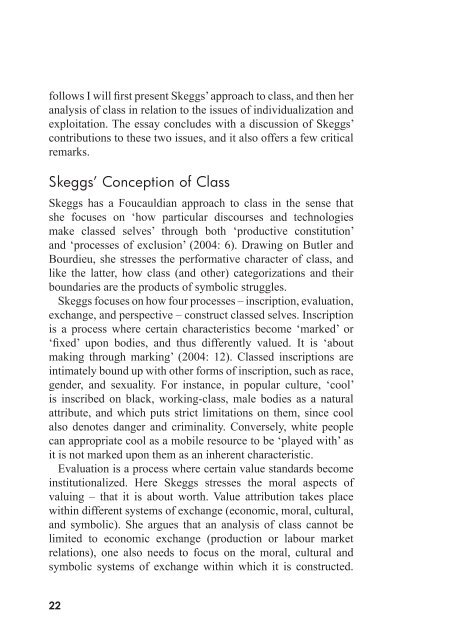Thinking with Bevereley Skeggs - Stockholms universitet
Thinking with Bevereley Skeggs - Stockholms universitet
Thinking with Bevereley Skeggs - Stockholms universitet
- No tags were found...
You also want an ePaper? Increase the reach of your titles
YUMPU automatically turns print PDFs into web optimized ePapers that Google loves.
follows I will first present <strong>Skeggs</strong>’ approach to class, and then heranalysis of class in relation to the issues of individualization andexploitation. The essay concludes <strong>with</strong> a discussion of <strong>Skeggs</strong>’contributions to these two issues, and it also offers a few criticalremarks.<strong>Skeggs</strong>’ Conception of Class<strong>Skeggs</strong> has a Foucauldian approach to class in the sense thatshe focuses on ‘how particular discourses and technologiesmake classed selves’ through both ‘productive constitution’and ‘processes of exclusion’ (2004: 6). Drawing on Butler andBourdieu, she stresses the performative character of class, andlike the latter, how class (and other) categorizations and theirboundaries are the products of symbolic struggles.<strong>Skeggs</strong> focuses on how four processes – inscription, evaluation,exchange, and perspective – construct classed selves. Inscriptionis a process where certain characteristics become ‘marked’ or‘fixed’ upon bodies, and thus differently valued. It is ‘aboutmaking through marking’ (2004: 12). Classed inscriptions areintimately bound up <strong>with</strong> other forms of inscription, such as race,gender, and sexuality. For instance, in popular culture, ‘cool’is inscribed on black, working-class, male bodies as a naturalattribute, and which puts strict limitations on them, since coolalso denotes danger and criminality. Conversely, white peoplecan appropriate cool as a mobile resource to be ‘played <strong>with</strong>’ asit is not marked upon them as an inherent characteristic.Evaluation is a process where certain value standards becomeinstitutionalized. Here <strong>Skeggs</strong> stresses the moral aspects ofvaluing – that it is about worth. Value attribution takes place<strong>with</strong>in different systems of exchange (economic, moral, cultural,and symbolic). She argues that an analysis of class cannot belimited to economic exchange (production or labour marketrelations), one also needs to focus on the moral, cultural andsymbolic systems of exchange <strong>with</strong>in which it is constructed.22
















